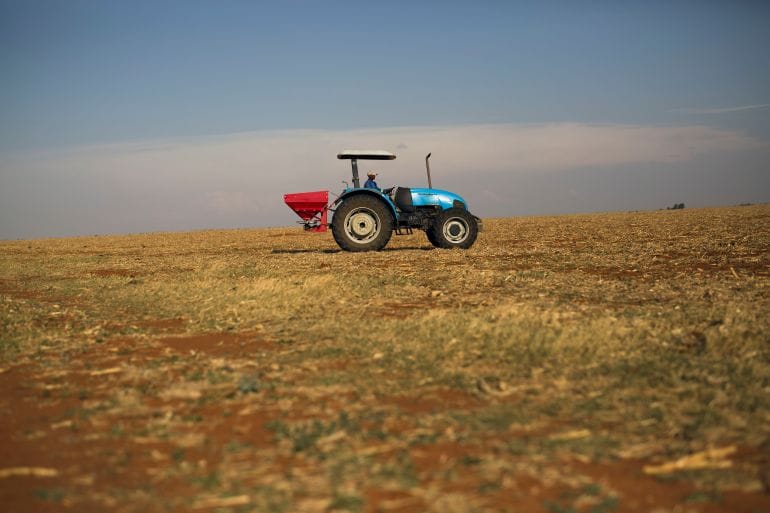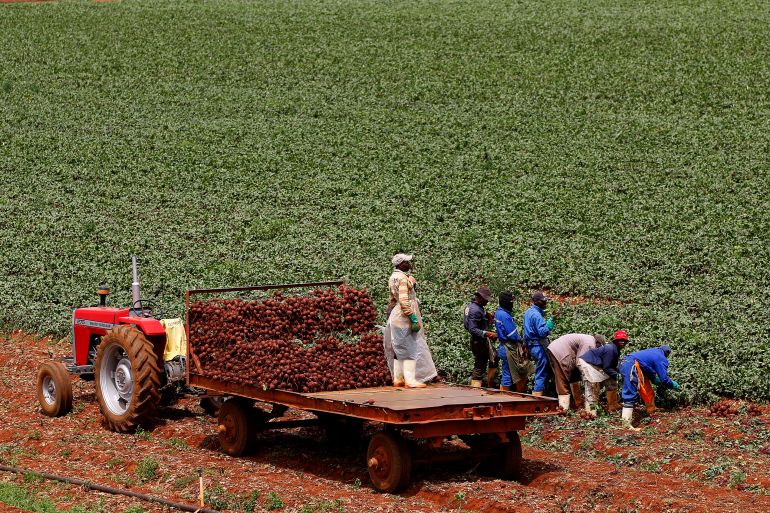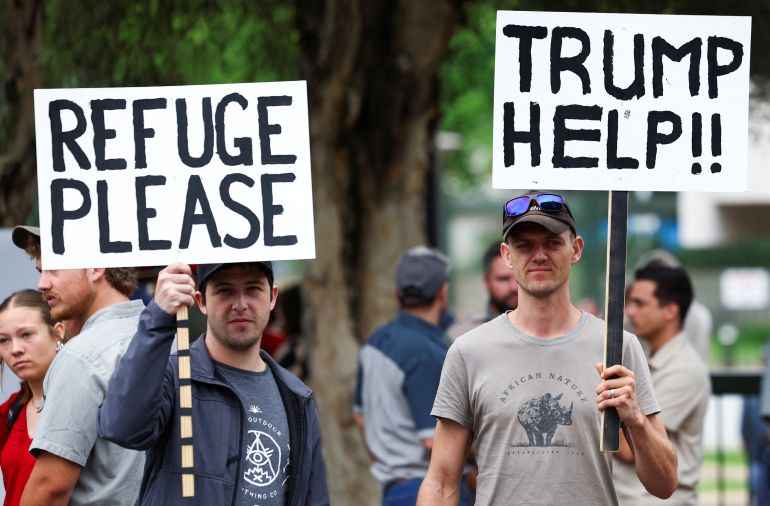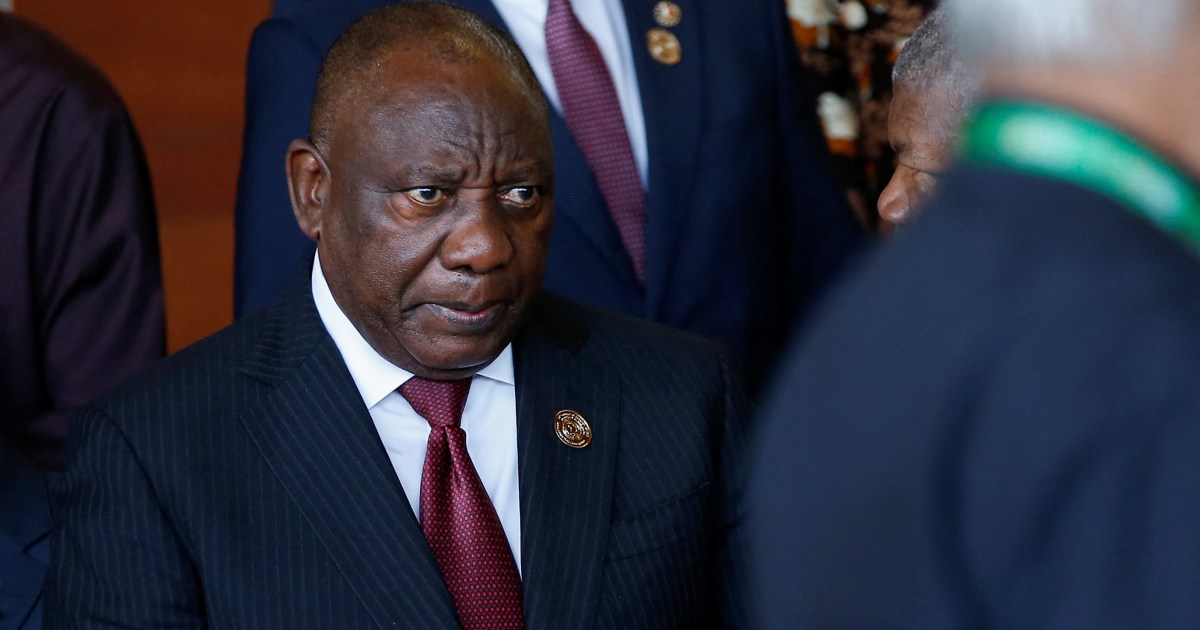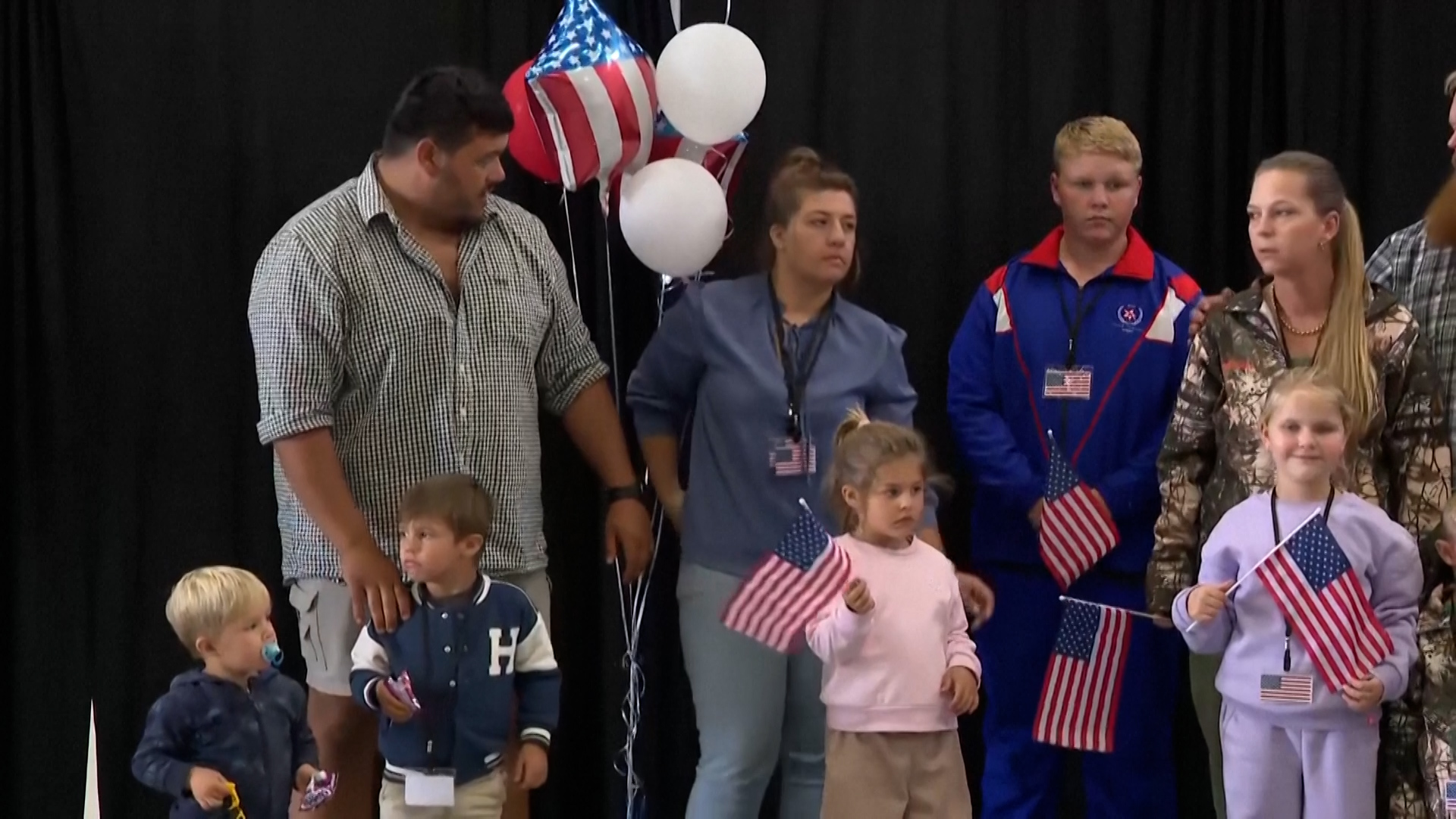South Africa’s Ramaphosa to visit Trump: Can they fix tricky relations? | Donald Trump News
South Africa’s President Cyril Ramaphosa will begin a state visit to the United States on Monday in what his government describes as an attempt to “reset” the relationship between the two countries, which many experts say has become the frostiest in decades.
The visit comes just days after the US welcomed a group of 59 white South African “refugees” who President Donald Trump claims are being persecuted in South Africa because of their race, and are facing a “genocide”. They flew to the US on a special relocation plan and will be allowed to settle there.
Ramaphosa’s government denies those allegations and says whites, who own more than 70 percent of the land despite making up just 7 percent of the population, are not discriminated against.
In a statement, Ramaphosa’s office said the two leaders would discuss “bilateral” and “global issues of interest”. The White House has not yet made a statement regarding the meeting.
This is the first time Trump will host an African leader at the White House since he took office in January. South Africa, which currently presides over the G20, will hand over leadership to the US in November.
Here’s the timeline of the anticipated meeting, as well as a breakdown of the main issues which have caused tension and are most likely to be tabled:
When is the meeting?
Ramaphosa will travel on Monday, May 19, and will meet with Trump at the White House on Wednesday, May 21.
His office did not share an agenda for the talks, but said that “the president’s visit to the US provides a platform to reset the strategic relationship between the two countries”.
The agenda is expected to include the treatment of white South Africans, aid cuts and the ongoing wars in Ukraine and Gaza.

What will Trump and Ramaphosa discuss?
The agenda is expected to include the following subjects:
Treatment of white South Africans
The issue of relations between South Africa’s historically advantaged white minority population and Ramaphosa’s Black-led government has been the most touchy one between the two governments.
White Afrikaners are descendants of mainly Dutch colonisers who, until 1990, controlled the country under an apartheid system that segregated and excluded the Black majority. Many of the most successful business leaders and farm owners in the country are still white. More than half of the Black population is categorised as poor.
Trump and his billionaire ally, South African-born Elon Musk, have severely criticised the Ramaphosa administration’s alleged poor treatment of these white people in the country, following Ramaphosa’s signing into law of an Expropriation Bill which allows the government to confiscate land, in some instances, without compensation. The law, signed in January, allows expropriation from any land owner for redistribution to marginalised groups such as women and people with disabilities.
Some Afrikaner groups say the law could allow their land to be redistributed to some of the country’s Black majority.
Trump has highlighted allegations by a group of white South Africans who fear that their land will be seized. This group also says white farmers face a disproportionate number of violent assaults, which have led to several deaths and amount to a “genocide”.
The South African government has denied that there is a genocide and says the attacks are part of a wider crime problem. Speaking at the Africa CEO forum in Abidjan in Ivory Coast on May 13, Ramaphosa said the US government “has got the wrong end of the stick”, as South Africa suffers overall from high rates of violent crime, regardless of the race of victims. Both white and Black farmers have been targeted in farm attacks, in which armed criminals have assaulted, robbed and sometimes murdered farm workers in usually remote locations.
Meanwhile, Musk, who is the founder of internet company Starlink, also blames the government for the company’s failure to launch in South Africa because of its Black empowerment laws which require that large corporations and businesses seeking government contracts be owned in part by marginalised groups such as Black people.
In a March post on his X social media platform, Musk said Starlink was not allowed to launch “because I am not black”. Officials have denied these allegations and say the country’s business laws are meant to right historical wrongs.

Tariffs and aid cuts to South Africa
Since re-entering the White House in January, Trump has implemented a triple whammy of economic policies that have hit South Africa hard.
First were the sweeping aid cuts the US announced after Trump signed an executive order pausing foreign aid to all countries for at least 90 days.
That disrupted funding for treatment and research in South Africa for deadly communicable diseases like HIV. South Africa has the largest number of people living with HIV in the world, and until then, the US provided about 18 percent of the government’s HIV budget. In 2023, the US provided $462m in HIV aid. Since January, some HIV treatment programmes have remained cut, while others have had their funding reinstated, although it’s unclear how many.
In February, Trump ordered that additional financial aid be cut specifically to South Africa over what he said was “unjust racial discrimination”, citing the alleged confiscation of white-owned land. He also cited South Africa’s filing of its genocide case against Israel over its war on Gaza at the International Court of Justice (ICJ) in December 2023. Details of the further aid cuts were not made public.
Finally, South Africa has also been hit by Trump’s tariff war. The country was slapped with a 30 percent tariff on all goods in April. An additional 25 percent tariff was placed on South African-made vehicles entering the US, putting vehicle surcharges at 55 percent.
Ramaphosa described Trump’s actions as “punitive” and said the tariffs would “serve as a barrier to trade and shared prosperity”.
Although Trump paused reciprocal tariffs for most countries (including South Africa) for 90 days on April 9, South Africa’s government wants tariffs to be permanently dropped. South Africa also still faces the baseline 10 percent tariff on goods that Trump has imposed on all countries.
The US is South Africa’s second-largest bilateral trading partner after China. Under the duty-free Africa Growth Opportunity Act introduced in 2000, South Africa sells precious stones, steel products and cars to the US, and buys crude oil, electrical goods and aircraft in return.
The AGOA framework, which includes 32 African countries, is up for renewal this year, but it’s unclear if Trump’s White House will follow through with it.

Israel-Gaza ICJ case and Gaza War
The South African government filed its genocide case against Israel at the International Court of Justice (ICJ) on December 29, 2023, accusing it of “genocidal acts” during its assaults on Gaza, to the anger of Israel’s ally and major weapons supplier, the US.
The landmark case highlighted the African country’s vocal and visible support for the Palestinian cause and was the first court case against Israel in the ongoing war in Gaza. Hearings began in January 2024. In March 2024, the ICJ issued an emergency order that Israel ensure food aid deliveries into Gaza and cease its offensive in Rafah.
Both Joe Biden’s and Trump’s administrations in the US have opposed South Africa’s move, with Trump denouncing Pretoria’s “aggressiveness”. On February 7, Donald Trump signed an executive order pausing aid to the country. The order cited the ICJ case, the Afrikaner issue and South Africa’s alleged collaboration with Iran to develop nuclear weapons.
South Africa, meanwhile, has promised not to withdraw its case despite this backlash. Foreign minister Ronald Lamola told The Financial Times in February that there was “no chance” the country would back down.
“Standing by our principles sometimes has consequences, but we remain firm that this is important for the world and the rule of law,” he said.

Ukraine-Russia War
Trump and Ramaphosa are also expected to discuss peace and mediation efforts in the Ukraine-Russia war as representatives of the two countries hold talks for the first time since the war began in February 2022.
The Trump administration has taken a lead role in mediating between Russia and Ukraine. During his election campaign, Trump promised to negotiate an end to the war “within 24 hours” if elected. Much of that effort, seen by some as aggressive, has fallen flat, however. A state visit to the US by Ukrainian President Volodymyr Zelenskyy ended with Trump and his deputy, JD Vance, shouting at their guest in February this year.
South Africa, meanwhile, has opted to stay neutral in the conflict and has called for dialogue between the sides. The country is a historical ally of Russia because of the former Soviet Union’s support during apartheid. Both are also founding members of the growing BRICS alliance of economies, alongside India, Brazil and China, which some see as a rival to the G5 group of richest countries.
South Africa has not condemned Russia or Putin for the invasion of Ukraine, and has abstained from a United Nations resolution that did so.
At the same time, Pretoria has remained friendly with Ukraine. In April, Ramaphosa hosted Zelenskyy during a state visit during which they discussed increasing trade and the ongoing war, with the Ukrainian leader calling for more pressure on Moscow.
Hours before Zelenskyy met with Ramaphosa, the South African leader said he spoke over the phone with Trump, and they both agreed that the war needed to stop.
